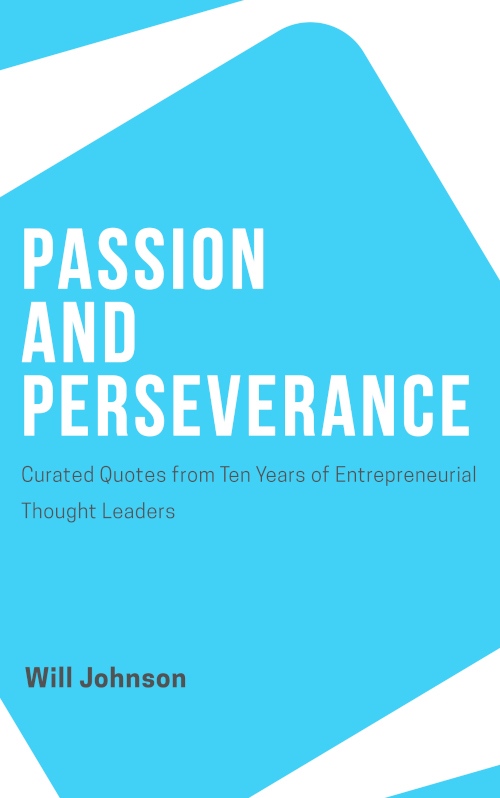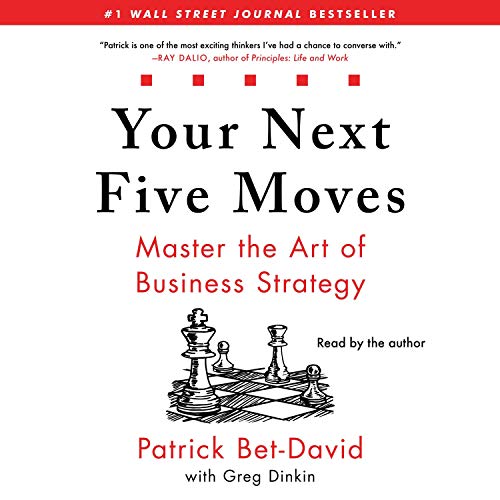I have long held the belief that business content (conference talks, books, podcasts, blog posts) fall on a spectrum between inspirational and actionable. The very best content is both–it not only makes you want to conquer the world but tells you exactly how to do it. Often, content falls at one of the extremes. Purely inspirational content can often be called fluff while purely actionable content can be an instruction manual. Sometimes you need just one of those but, with my limited time, I usually prefer content to be both.
Some select content that achieves both for me:
- Principles by Ray Dalio
- Startups for the Rest of Us
- Harvard Business Review
Your Next Five Moves by Patrick Bet-David is really good, and I have already recommended it to a few people, but doesn’t quite make that list. It falls a bit more on the inspirational side of the spectrum but it does a good job pointing you to source material which may be more actionable.
The author holds Principles in as high regard as I do and references it multiple times. In fact, if I were to sum up Your Next Five Moves in a sentence it would be:
Principles for people early in their career.
That isn’t to say it is just for people in their 20s. I believe that the majority of us–those that aren’t CEO masters of the universe–will find valuable takeaways in the book.
The Five Moves
Like a lot of business books (The ONE Thing comes to mind), the title, *Your Next Fives Moves* means multiple things. Bet-David uses it as both a formula for personal development as well as applying strategic thinking to your goals and challenges you face.
The fives moves are:
1. Master knowing yourself
2. Master the ability to reason
3. Master building the right team
4. Master strategy to scale
5. Master power plays
Knowing Yourself
The strongest part of the book is about knowing yourself. This question is asked to the reader (and asked many times in order to reiterated its importance):
Who do you want to be?
Knowing the answer to that illuminates the path for you to take in life. It is a frame through which every decision in your life should be viewed. It provides clarity and purpose.
I absolutely love how simple and powerful that question is. Fulfillment is less abstract when you have a vision of who you are to work towards. Self-awareness unlocks your potential.
When you’re fighting for a cause, a dream, something greater than yourself, you will find the enthusiasm, passion, and joy that makes life a great adventure.
Bet-David points out that having identified your purpose, you will be able to productively channel the struggles and failures you have along the way. Those become learning opportunities and the fuel for the hard work that you will need to put in in order to achieve your goals.
Reason and Strategy
Bet-David doesn’t break new ground in the sections about reason and strategy but he does do a good job providing some frameworks for processing issues and creating short and long-term strategies.
Process is a superpower for a business and a businessperson. Building repeatable processes allows a business to automate and move quicker. Resources are finite and more can spent on growth when systems (software, data pipelines, checklists, partnerships, etc.) are reducing the personnel and mental resources needed for operations.
For a businessperson, having a decision making process allows one one to put aside emotion and achieve the best resolution that the information and circumstances allow. Owning responsibility for a situation allows you to bypass the blame game and more quickly move through the process towards an acceptable outcome.
When you start viewing a crisis as an opportunity, you are winning the game.
Power Plays
The power plays are the culmination of the other moves. They are the opportunities that you worked for–the opportunity to level up. To be in a position for a power play you need to be able know yourself and who you want to be, to process information to make optimal decisions, to build a great team, and how to do long-term planning.
The power plays come in the form of networking, negotiating, and selling. Advice is given on each of those with emphasis on knowing what drives other people: advancement, individuality, madness, or purpose. Having conviction–total belief in yourself and your work–makes those easier.
And that really is the key. Once you know, and truly acknowledge, yourself, your actions and interactions serve your purpose. This is a lesson for everyone–no matter their age–and is a lesson this book delivers well.


